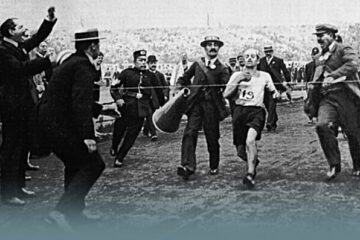Triumph or Deception? | The Complex Story of East Germany’s Swimmers! (Part One)!
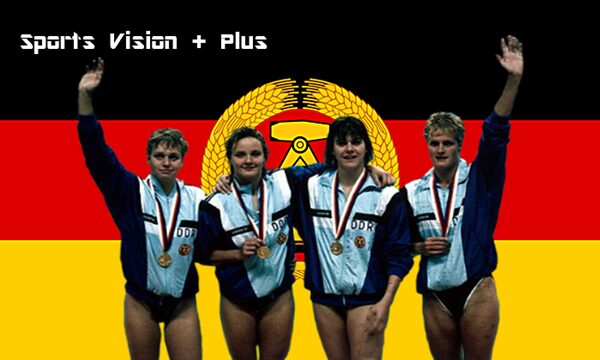
The Rise and Fall of East Germany’s Swimming Dynasty ;
The Forgotten Stories of heroes ;
The Tarnished Records or real champions?
A Story of Athletic Greatness or Systematic Doping?
Part One!
East Germany was considered the world’s swimming powerhouse, its athletes gliding through the water with nearly mechanical efficiency to win the lion’s share of gold at international competitions. But East Germany no longer exists. And neither does German swimming supremacy.
1. European Championships!
I’m traveling back in time with my memories. There are hot summer days in 1985. From a small black and white TV screen, I’m following with great interest the swimming competitions for the European Championships taking place in Sofia, Bulgaria, from August 4-11.
I am a high school student, from a European country of the Eastern Bloc, or more precisely we were allies once upon the time with the Eastern Bloc countries, but for some time now my country has been hermetically sealed and does not accept any kind of alliance with the outside world of any bloc during the last years of Cold War!
I’m watching “secretly” the swimming competitions, on a TV channel from a neighboring western bloc country, hiding from the eyes and ears of some fanatical person from the ruling communist party who could prove fatal for me and my parents since in my country everything foreign is prohibited by law, including sports!
Even sports?
Yes, sports too!!
I know, for many, or for today’s generation in general, this fact may be unimaginable and inconceivable!
However, just to jog the memory of my generation who grew up in those years, the Cold War between the two superpowers USA vs USSR and the countries divided into west and east is coming to an end. Right after the end of World War II, the world is divided ideologically, politically and militarily, into “We” and “You”, everything is divided…
I am passionate about sports in general, and as such, I try to follow and collect every newspaper, photos, souvenir and any magazine that manages to sneak into my country, even keep notes about world sports.
So, I’m following the European Swimming Championships with great interest for the first time. I’ve opened my notebook and am writing down every race, every winner and every result.
I have no sympathy or fan feelings for German athletes, but I have to admit that I am amazed and at the same time completely surprised by the women’s competitions, where 99.9% were won by East Germans!
Since it is my first experience assisting, I think to myself that this must be a world record and such a success from the GDR could not have been achieved by any other country before. But I’m wrong because in the European Championships of 1974, 1981, 1983, East Germans won all the women’s competitions!
In fact, if we refer to statistics, the Germans have been winners since the very beginning of the European Swimming Championship, back in 1926, in the very first edition of water sports. The Germans have also won the following editions of 1927, 1934, 1938……
It is a fact that must be mentioned and that we will need in this long investigative article, to prove that the Germans did not emerge victorious “out of the blue” in the `70s!!!
However, in this 1985 edition, with the exception of the 200m breaststroke, where the winner was Bulgarian Tanya Bogomilova, the others were all East Germans, and even the second places in most of the races were taken by them.
Heike Friedreich, Astrid Strauss, Birte Weigang, Cornelia Sirch, Sylvia Gerasch, Kornelia Gressler, Jacqueline Alex dhe Kathleen Nord they became European champions that year.
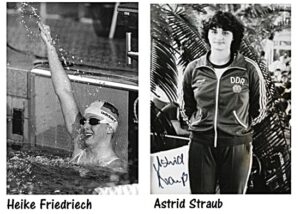

Heike Friedreich has won 5 golds
(100m, 200m Free st; 4x100m, 4x200m Free st dhe 4x100m Medley), while Astrid Strauss won 4 golds (400m, 800m Free st. dhe 4x100m, 4x200m Free st).
Meanwhile Manuella Stellmach, Anke Mohring, Kathrin Zimmermann, Silke Hoerner, Petra Zindler, Susanne Bornike, Iris Zscherpe, Susanne Schuster, Christiane Pielke, Karin Seick, they increased the number of silver and bronze medals, completing East German records as a absolute European supremacy in swimming.
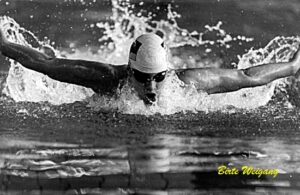

GDR swimmer Kathleen Nord
The women won 14 gold medals out of 15 that were on the program of this Europeans. 11 were silver and only 4 bronzes making a total of 29 medals. East Germany took first place in the medal table of this Europeans:
17 Gold / 17 silver / 6 bronze = 40 Total!
Behind them were the USSR: 7 Gold / 4 Silver / 6 Bronze = 17 medals in total!!!
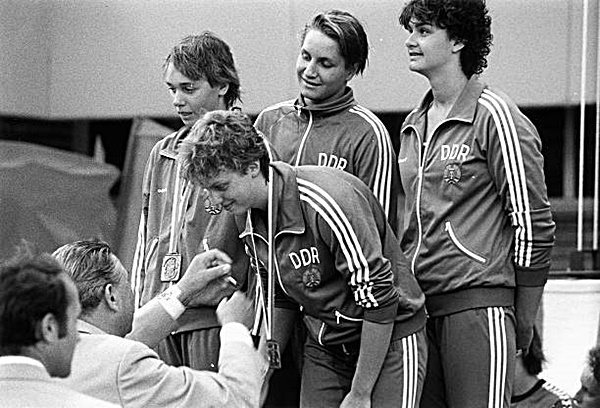
4×200 meters in Medley GDR Team at the European in Sofia, Manuela Stellmach, Karen König, Astrid Strauss; Heike Friedrich.
Statistics also show that East Germany has been a systematic winner of the European Championship since the 1974 edition until 1989, where the women in particular were invincible and absolute winners of the gold medals!

1988 – Olympic Games 4x100m Free St. DDR Team Kristin Otto, Manuela Stellmach, Daniela Hunger, Katrin Meissner
2. World Championships
On the world stage, the first swimming championships were held in 1973 in Belgrade, former Yugoslavia. Based on the results, in the women’s competition, the East Germans won 10 gold medals out of 14 and broke 6 world records. There were 5 silver medals and 3 bronze medals for a total of 18 medals.
Their American rivals only managed 3 gold, 7 silver and 3 bronze medals for a total of 13 medals. The American swimmers lost their direct competitions to the East, so in the 100m Free St Shirley Babashoff lost to Kornelia Ender.
100m Backstroke, Melisa Belotte (USA) did the same to Ulrike Richter (GDR), add here the two relays 4x100m Free St and 4×400 Medley lost by the American team.
Kornelia Ender (100m Free St-WR 57;54); Ulrike Richter; Renate Vogel; Rosemarie Kother (200 m Butterfly-WR 2;13;76), Andrea Hubner (200m Inv. Medley WR-2;20;51), Gudrun Wegner (400m Inv. Medley WR-4;57;51) they were the world champions.
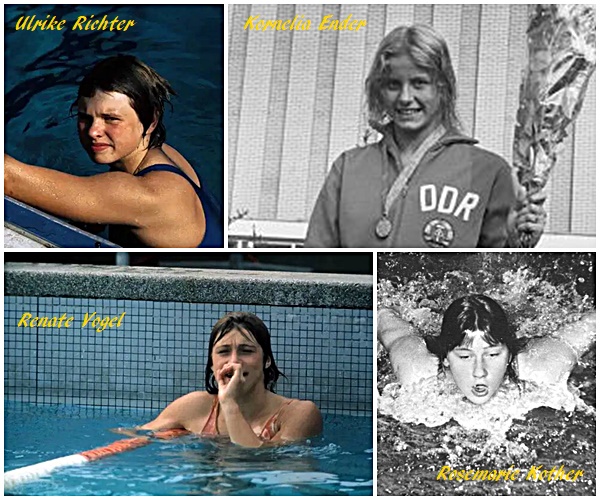
The other two world records were broken in the relays 4x100m Free St. (3;52;45) and 4×400 Medley (4;16;84)

In the 1975 World Championships, the success of East German swimmers was almost similar to that of 1973.
In the 14 scheduled events, the Easterners won 10 gold medals, breaking three World Records: Birgit Treiber in 200m backstroke 2:15.46 / Kornelia Ender (GDR) 100 m butterfly 1:01.24 / Relay 4 × 100 m freestyle 3:49.37 (Kornelia Ender; Barbara Krause; Claudia Hempel; Ute Brückner); not to mention 6 world championship records.

East German swimmer Kornelia Ender- Olimpic, European and World Champion titles!
Kornelia Ender won the duel with the American swimmer Babashoff in the 100m Free St. who got her revenge in the 200m Free St. race.
Rosemarie Kother did the same against the US swimmer Valerie Lee in the 200m Butterfly. American Kathy Heddy defeated the East German Ulrike Tauber in the 200m Individual medley.
In the end, the Easterners won both the 4x100m Freestyle relay and the 4x100m medley against the US swimmers.
The Eastern Europeans who became world champions in this edition were: Kornelia Ender (3 golds); Hannelore Anke (3 golds); Ulrike Richter (2 golds); Birgit Treiber; Rosemarie Kother (2 golds);
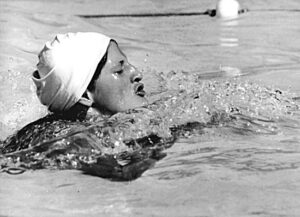 East German swimmer, world champion, Hannelore Anke
East German swimmer, world champion, Hannelore Anke In the 1978 edition, suddenly, the Easterners are no longer under the spot light of the stage as winners. Only Barbara Krause is the gold medalist in 100m Free st. Meanwhile, the Eastern swimmers win 7 silver medals and three bronze medals. The triumph of the American swimmers who this time win 9 gold medals, where 7 of them were won in duels against the Easterners.
At the end of this championship, which proved successful for US swimmers, there were no voices complaining against the Easterners, compared to two years ago, at the Montreal Olympics, when American swimmer Shirley Babashoff complained and expressed doubts about the victories of the Eastern swimmers, more or less justifying her own losses, and we will talk about this case a little later in this article.

We have entered the 80s.
The 4th edition of the World Championships in 1982, is taking place in Guayaquil, Ecuador. And here again is a sensational return of eastern swimmers as triumphant and winners in 10 women’s competitions, among which one name appears: Kristin Otto, winner of three gold medals in this world, alongside other champions: Birgit Meineke (3 golds, one silver); Ute Geveniger (2 golds; 2 silver) Carmela Schmidt; Cornelia Sirch (W.R 200M Backstroke 2;09;91) ; Ines Geibler (2 golds); Petra Schneider (2 golds and WR in 400M Indiv. Medley 4;36;10) and the two relay teams of the 4x100m Free st race: Suzanne Link; Caren Metschuk.
The Relay 4x100M Medley broke WR, 4;05;88 (Otto; Geveniger, Grabler and Meineke)
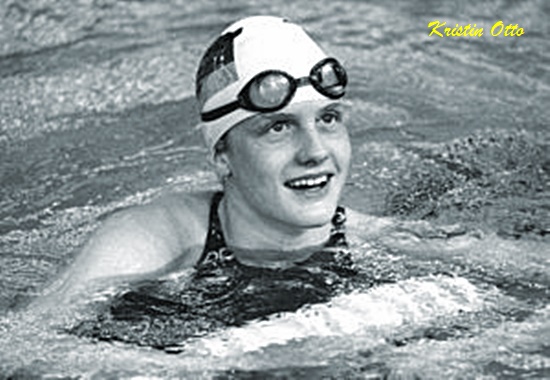
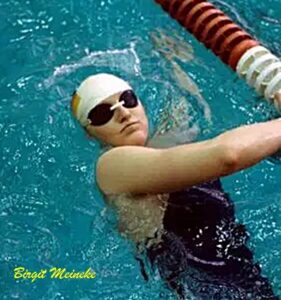
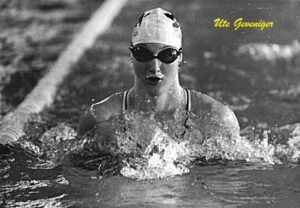
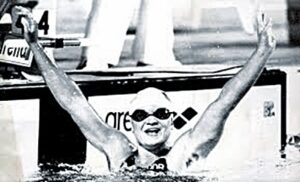
The same music plays in the 1986 edition. In the 16 scheduled competitions (where 50m Free st and the relay: 4x200m Free st were added), eastern swimmers win 13 with new names: Kristin Otto (4 golds and one silver); Heike Friedrich (4 golds); Astrid Straus (2 golds and 1 silver); Manuella Stellmach (2 golds in the 4×100 and 4×200 Free st relays) Cornelia Sirch; Silvia Gerasch; Silke Horner; Kathleen Nord; Kornelia Grebler (2 golds)…..
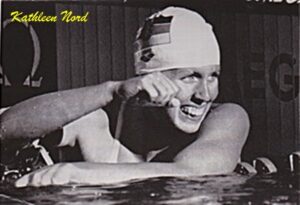
The East German women’s team won against the American swimmers in the three scheduled relays 4×100, 4×200 Free st and 4×100 medley!
The East Germans break 4 world records: 100m breaststroke, Sylvia Gerasch (1;08;11) / 200m Breaststroke, Silke Horner (2;27;40) / Relay 4x100m Free st (3;40;57) and 4x200m Free st. (7;59;33)
This is the last dominance of the Eastern swimmers after the changes and the fall of the Eastern bloc in 1990. In the 1991 world edition there will be only one Germany, although unified there are no more Eastern champions.
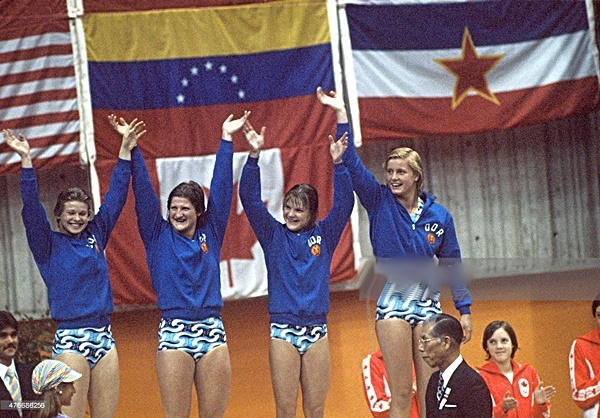
3. Olympic Games!
1908-1972
It seems that the accusations of steroid use by East German swimmers begin at the 1976 Olympics. Everything seems to start and take off that same year, even though there are only suspicions.
If we look for and refer to the Olympic statistics of German swimmers in general, before 1976, then we will find that German medalists and champions are sporadically present, in almost every Olympics, but still this fact cannot prove all the accusations of their sudden transformation into absolute champions, precisely in 1976 and after this year, just as you cannot say with complete certainty that they (the german women ) did not have a tradition in the sport of swimming.
Thus, in the 200 m Breaststroke race:
Hidegard Schrader (1928, Amsterdam) is the gold medal winner for Germany. In the same race, but at the Berlin Olympics (1936) Martha Geneger has won the silver medal.
Ursula Happe is another gold medal winner at the Melbourne Olympics 1956.
In Rome, 1960, Wiltrud Urselmann has won the silver medal in this race.
In the 100 m butterfly race, at the 1972 Olympics in Munich, Roswitha Beier had won the silver medal. 200 m Individual at the 1972 Olympics, Kornelia Ender will also win the silver medal.
400 m Individual Medley, in Mexico City (1968) Sabine Steinbach is the bronze medal winner. The German Relay in the 4×100 m Free style, is a four-time silver medalist in Stockholm 1912, Berlin 1936, Mexico City 1968; Munich 1972; bronze medalist in Rome 1960.
In the 4×100 Medley relay, the German team is a bronze medalist in Rome, 1960 and 1968 in Mexico and winner of silver medals 1972 in Munich.
1976-Montreale
The scrupulous historian of the Olympic Games, David Wallechinsky, in the book “The Complete Book of the Summer Olympics”, on page 744, writes this about the winner of the 100m Freestyle race, Kornelia Ender and the East German swimmers:
“At Munich in 1972, the East German women swimmers failed to win a single gold medal, yet four years later in Montreal they were able to finish first in 11 of 13 events. This extraordinary transformation actually began at the 1973 world swimming championships in Belgrade, Yugoslavia, where the East German women appeared wearing the latest model of their
skin-tight, semi-see-through Lycra suits.
Some people began to raise a protest, until it was revealed that the suits had actually been invented and manufactured in West Germany. By 1976 the Americans in particular were also accusing the East German women of appearing too muscular and masculine, of being shot up with anabolic steroids, and of being “all work and no play” types, who would be unable ever to bear children.
Although there is no doubt that steroids and other drugs were being used by virtually all East German women swimmers, whether they knew it or not, East Germany’s success also depended on the enormous emphasis that country placed on legitimate sports science. While U.S. and Soviet scientists were busy conquering space and designing weapons system the East Germans were studying athletes-taking blood and muscle biopsies, checking oxygen levels, and testing nutritional needs. The scandalous “Belgrade suits” of soon became commonplace throughout the world. Like the East Germans were years ahead in studies of such that lactic acid buildup during training.
At the age of 13, Kornelia Ender of Bitterfeld won three medals at the 1972 Olympics. The following year, in Berlin, she broke Shane Gould’s world record in the 100- freestyle. In the three years preceding the 1976 Olympic Ender broke the world record for that event nine times. Months before the Montreal Games, the 5-foot 10-inch, pound Ender announced her engagement to backstroke swimmer Roland Matthes. She set her tenth 100 meters world record in the Olympic final, her second gold medal of the Games. The Olympics were over, Kornelia Ender was reunited with grandmother, who had left East Germany in 1961 and moved to Kansas. After the fall of the Berlin Wall, in 1989, Ender revealed that during her competitive career, she was given injections without being told what they contained”.
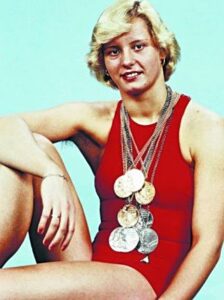
Kornelia Ender after breaking the world record in the 100m Free st, then returned to face Shirley Babashoff in the 200m Free st race. In this race Babashoff had beaten the East German in the 1975 World Championships, but Ender had beaten her winning time by three seconds in 1976. And now the two are challenging each other again at this Olympics. Babashoff took the early lead and held it for the first 100meters, but Ender moved ahead over the next length of the pool and won breaking the World Record and winning the second gold in 27 minutes of the races. She thus became the first female swimmer to win four golds at one Olympics.
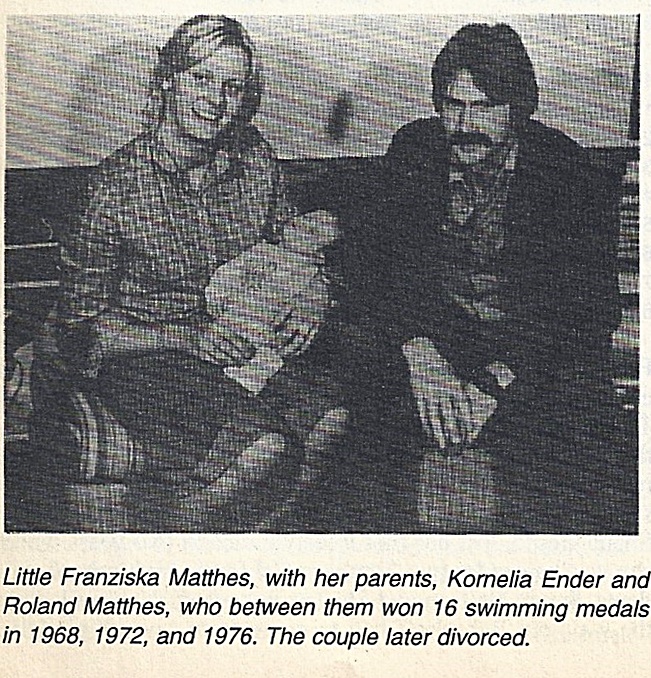
In the 400m Freestyle race on June 3, 1976, Barbara Krause broke the American record of Babashoff by three seconds, but two weeks later she suffered an attack of angina and had to be dropped from the East Germany team. Meanwhile, 15-year-old Petra Thumer, who had finished behind Krause in the East German Championship, won the gold medal, beating Babashoff with a world record time of 4;09;89.
In the 800m Freestyle race, the winner is again the East German Petra Thumer and again against the American Shirley “Surely” Babashoff (as she would be ironically called in that time by the press due to her constant complaints against the German winners and rivals).
This race was the last opportunity for the American swimmer to win at least a individual gold medal, however she wins one with the freestyle relay US team.
Even in this race Thumer broke the world record with a time of 8;37;14! Here too we are referring to the description and opinion of Mr. Wallechinsky, who says this:
“There is no question that Petra Thumer, like all East German swimmers in 1976, had been taking anabolic steroids. If she and the other East Germans hadn`t, they would have been kicked off the team….” and he finishes his opinion like this” if the East German swimmers had been disqualified, Babashoff would have won five gold medals, a feat that has still never been achieved in the Summer Olympics by an Amerikan woman”.
There is no doubt, with his opinion, and maybe he is right, but whatever the accusations, opinions, doubts regarding Babashoff’s serial losses in 1976, of course without wanting to defend anyone, why do IOC, FINA and LEN, in contradiction to the “truth of these accusations”, continue to refuse to withdraw the medals of the “fraudsters”?
At the 1980 Moscow Olympics, Petra Schenider beat Britain’s Sharron Davis by 10 seconds in the 400M Medley and breaking world record. 18 years after that race, in 1998 the two ladies met at the Hotel “Chemnitz” and Schneider admitted she had been instructed to take blue pills that turned out to be the steroid Oral Turinabol. Among other things, the East German added that she would support Davis to return the gold medal to her. After Ender’s, this is another piece of evidence about the use of steroids by some East swimmers.
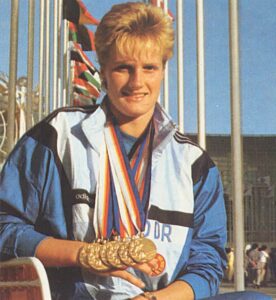
However, it is quite different the case of Kristin Otto, the swimmer who had a brilliant career during the 80s, being declared European, World and Olympic champion, multiple times. At the Seoul Olympics, in 1988 she managed to win six gold medals and broke the world records in 50M Free St. and 100M Butterfly. Otto has won three times as the best swimmer in the world in 1984, 1986 and 1988. She never admitted to having used doping, saying: “The medals are the only reminder of how hard I worked. It was not all drugs.”. The fact that she has passed all the anti-doping tests confirms that not all the champions of the former East Germany were doped.
Meanwhile, FINA and LEN as well as the IOC, the three official competent world, European and Olympic federations, continue not to withdraw any medals, even though there are stubborn facts and evidence.
The well-known football coach Vujadin Boskov, once asked about a questionable penalty, replied: “A penalty is when the referee blows the whistle.”
This article continues with the second part after 1990 with the emergence of STASI (German Secret Police) documents that reveal the government’s systematic doping program.
To be continued….
© By Pjerin Bj.
New York, January 2025
________________
Sports Vision +Plus / Hour of the Champions in activity since 2013
Photos are courtesy of Google.
Discover more from Sports Vision +
Subscribe to get the latest posts sent to your email.



